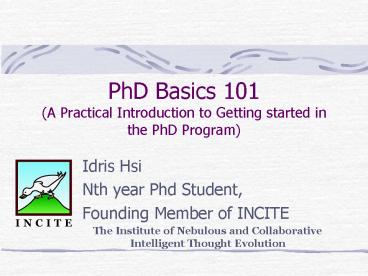PhD Basics 101 A Practical Introduction to Getting started in the PhD Program - PowerPoint PPT Presentation
1 / 17
Title:
PhD Basics 101 A Practical Introduction to Getting started in the PhD Program
Description:
... back in gear after being annoyingly sick with a cold for the last 3 days. ... PhD Admissions, PhD Recruiting, Faculty Hiring, Grad Liaison, Curriculum Review ... – PowerPoint PPT presentation
Number of Views:149
Avg rating:3.0/5.0
Title: PhD Basics 101 A Practical Introduction to Getting started in the PhD Program
1
PhD Basics 101 (A Practical Introduction to
Getting started in the PhD Program)
- Idris Hsi
- Nth year Phd Student,
- Founding Member of INCITE
- The Institute of Nebulous and Collaborative
Intelligent Thought Evolution
2
Goals of this Talk
- Familiarize you with the less obvious logistics
of PhD life. - Steer you away from potential pitfalls of PhD
life. - Pass on a little hard-earned knowledge
3
Mental Preparations
- Smarts only gets you halfway there. Endurance is
what ultimately matters. - Progress is always measured in terms of Research
Progress!! - Keep one sensory organ on the Big Picture.
4
The Research Diary
- Keep track of your research progress.
- Can be electronic or paper
- Make Daily Logs
- Meetings with advisor, research group,
colleagues, visitors - Talks, Papers, Conference notes
- Personal thoughts about work.
5
My Dissertation Journal
- March 2, 2003
- An idea about bipartite graphs number of portals
connected to concept is another measure of
importance - reflects activation cost
requirements on part of designer to concept. - Yahoo Messenger is freaking insane!!! Maybe I
need to pick a different application like
Microsoft Word 2.0. - April 14, 2003
- Wrote up Surveyor_Description for Melody
describing Surveyors basic functionality and
relationship to Architect. - Basically getting back in gear after being
annoyingly sick with a cold for the last 3 days.
6
The Electronic Bibliography
- Keep track of what youve read!
- Electronic bibliographies work with word
processors to produce instant bibliographies! - BibTex (UNIX), Endnote (PCs)
- File papers as you go.
7
Know Your Search Engines
- Besides Google.
- IEEE and ACM Digital Libraries
- CiteSeer
- Keep track of your search terms
- Revisit them periodically.
8
Develop Information Archiving System
- Sea of Information Problem
- Emails, To-Do Lists, Papers, Revisions of Papers,
Classwork, Lecture Notes, Meeting Notes, Business
Cards - Organize your information for easy retrieval.
Sooner the better. - Backup important data frequently! (Burn to CD)
9
Develop a Home Page
- Your Home Page should have the following (not
hidden) - Your name and a good picture.
- Description of your research interests
- Links to Publications, Research Affiliations, CV
- Anything else should be organized as secondary
information
10
Maintain Updated CV
- CV is an Academic Resume. Contains
- Publications Record
- Research Experience
- Service Record Community and Professional
Activities - Teaching Experience
- Membership in Professional Societies
- Etc.
11
Membership in Professional Societies
- Association of Computing Machinery
- IEEE Computer Society
- Special Interest Groups (SIGCHI, SIGSOFT, etc)
- Check with your advisor.
12
Other Practical Things
- Design and Practice your elevator speech (1
minute shot at fame and fortune) - Get Business Cards from the College before going
to conferences - Find out who the senior students are both in and
outside your area! - Find and maintain a stress release mechanism
(hobby, social outlet, exercise).
13
Get Involved
- Be a Student Volunteer at Conferences
- Serve on College Committees (GSC)
- PhD Admissions, PhD Recruiting, Faculty Hiring,
Grad Liaison, Curriculum Review - Give Talks about your research when you can.
- Give back to the community
14
Who are the people in your neighborhood?
- Who are the famous researchers in your area?
What are they famous for? - What are the major research topics right now?
- Where are the major centers for your work in the
world? - What are the major conferences?
- What are the politics associated with these
things?
15
Develop your Research Skills
- Identifying an important problem
- Identifying an unknown problem
- Recognizing good validation
- Technical Writing / Communication Skills
- Research Objectivity
- Develop a Problem Solving Toolkit
16
That Problem Solving Toolkit Thing
- Metacognitive skills reflect on your approach
to problems - Multiple approaches to same problem.
- Analogies, Metaphors, Visualization
- Occasionally read outside your area in science,
engineering, newspapers, and even literature.
17
Be Passionate (Optional)
- Remember why youre here!
- Find a topic that you will be excited about when
the going gets tough. - Learn to discuss research with anyone and
everyone.































